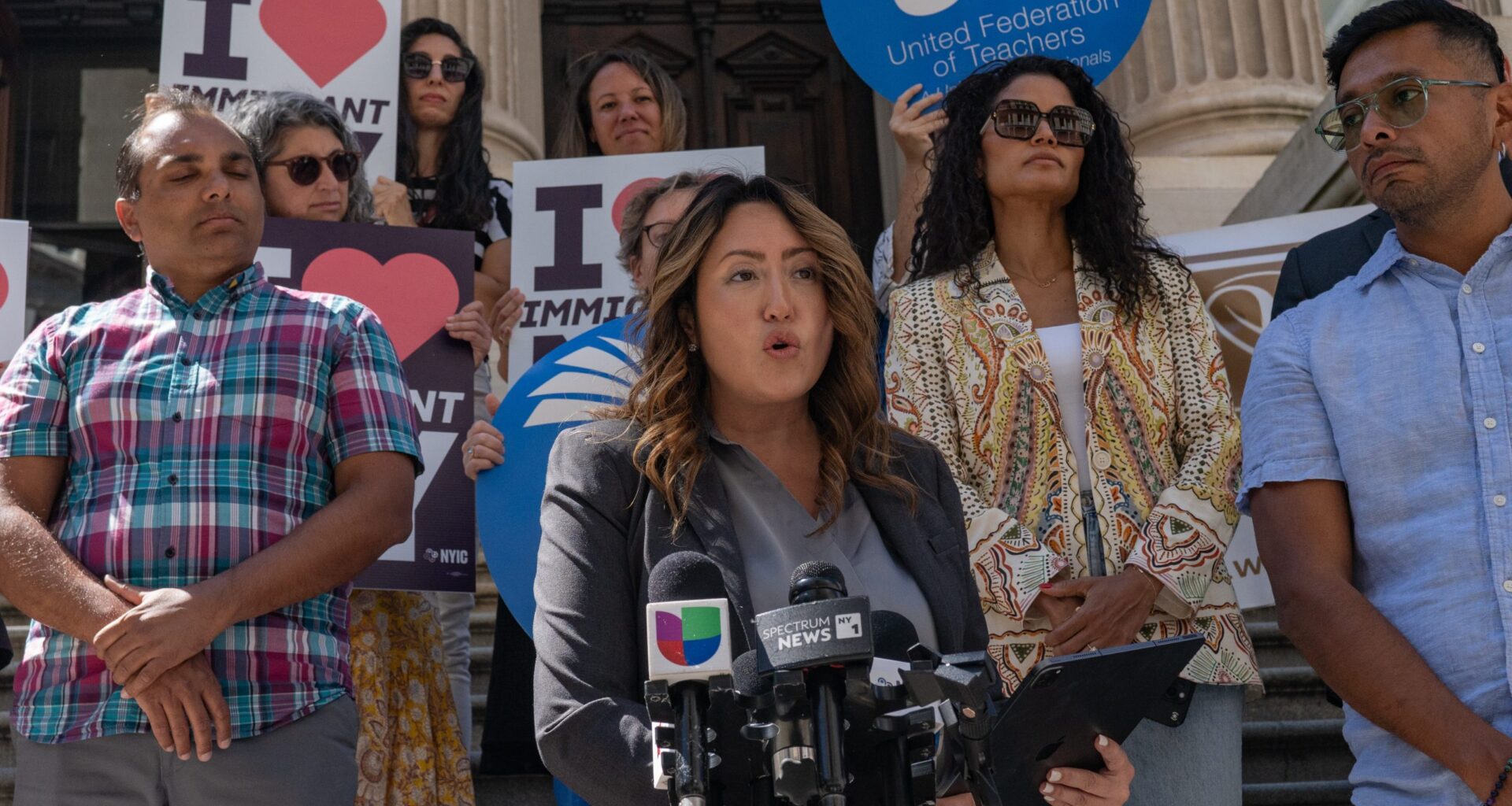As New York City’s students head back to public schools this September, immigrant families are forced to deal with the harsh reality of President Donald Trump’s escalating mass deportation and detention agenda.
But in New York, everyone between the ages of five to 21 has the right to free K-12 public education, regardless of their immigration status. Officials with the public schools want people to know that fact and not live in fear.
“New York City public schools stand with all of our families regardless of background or immigration status. Let me assure you our schools are safe places,” said NYC Public Schools Chancellor Melissa Aviles-Ramos at a press conference in Manhattan held by New York Immigration Coalition (NYIC) on August 27. “We are here to support our families.”
Aviles-Ramos said that the Department of Education (DOE) is training public school staff on “non-local law enforcement protocols.”
Mary Vaccaro, who is with the United Federation of Teachers (UFT), added that teachers were working hard in their trainings to be prepared for the year. Teachers and administration usually ask for emergency contact information, but many have vowed to never share this info with law enforcement, said Vaccaro.
Vaccaro said that parents have expressed a fear of putting their children on buses as well, and that teachers, social workers, guidance counselors, and paraprofessionals should be available to receive students as soon as they deboard and walk them into school.
NYC Panel for Education Policy (PEP) Government Affairs Committee Chair Naveed Hasan said that there have, unfortunately, been instances where parents and students have been questioned or deported.
“Since January, there has been a worsening federal immigration enforcement environment. Parents are getting harassed at their places of work. Children are being asked to show their papers while playing baseball in the park. Families are being detained at regularly scheduled court hearings,” said Hasan. “We’ve experienced an increasing number of public school students…taken by (Immigration and Customs Enforcement) ICE. They’re being held in deplorable conditions, shuttled from state to state, denied access to legal support and their education. Some have even been deported to countries from which they fled ever present danger.”
To combat this, PEP passed a resolution in January 2025 stating that the city’s public schools will protect all students, including migrant children. The on the ground effort to assist and protect immigrants is also valiantly led by advocates and nonprofits, said Hasan, that can help with things like school enrollment, seasonal clothing, books, temporary housing issues, referrals to legal services, court accompaniment, etc.
Hasan said that many that were previously helped are now returning to assist others.
Still, other elected officials encouraged caution.
“Right now it’s very difficult to say to anyone in New York City that face deportation that we can protect them in any of our public agencies, or City agencies, in any way,” said Brooklyn Borough President Antonio Reynoso, the first Dominican-American to serve in his role, at a rally for Haitian immigrant Temporary Protected Status (TPS) in Brooklyn.
Public Advocate Jumaane Williams warned about spreading misinformation and fear mongering as well. He said that as of this week there have been no “raids” on schools and places of employment that he’s aware of. “There is a lot of reason to be afraid out there,” said Williams. “ Just want to make sure that people are spreading accurate information.”
Families are encouraged to be equipped with resources to help them stay safe, including Know Your Rights information and family preparedness planning.
Quick guide to what you need to know about your or your child’s rights in school.
The information here is not a replacement for legal advice, but according to the New York Civil Liberties Union (NYCLU):
- A school cannot require proof of legal immigration status to enroll; and cannot ask about you or your parent/guardian’s citizenship, immigration status, or social security number.
- In general, school police only have the authority to investigate violations of school policy or other threats to school safety, not a student’s immigration status. If they do, you do not have to answer. Also, ask if your school district has a memorandum explaining your school police’s policies and if it includes protections for immigrant students.
- In general, ICE and police are not allowed to question or detain a student at school without parental consent unless there is a judicial warrant, or if there is an urgent safety issue at the school. Administrative warrants are not enough to justify questioning, detaining, or sharing a student’s immigration status.
- ICE can question you in public spaces such as a bus stop or the subway. However, inside buses are not public property, and ICE should not be allowed to board without a signed judicial warrant.
- General information – like your name, address, and telephone number – is not legally protected, and could be shared even without a warrant or subpoena. Check your school district’s policies to see what is classified as “directory information.” Check your school district’s policies to make sure they have rules for what to do if immigration officers request student data.
- If stopped, do not lie and do not falsely claim to be a citizen.
- If stopped, know you have a right to talk to a lawyer.
- You should carry your current school (identification) ID, driver’s license, or NYC ID and make sure your ID cards are not expired. If you are a Deferred Action for Childhood Arrivals (DACA) recipient, TPS holder, or permanent legal resident (green card holder), carry these documents with you. Never give a fake ID to an officer.
For more comprehensive information and guides or assistance, go to www.nyic.org/resources-training/kyr/ or contact NYCLU at schools@nyclu.org.
Like this:
Like Loading…
Related
